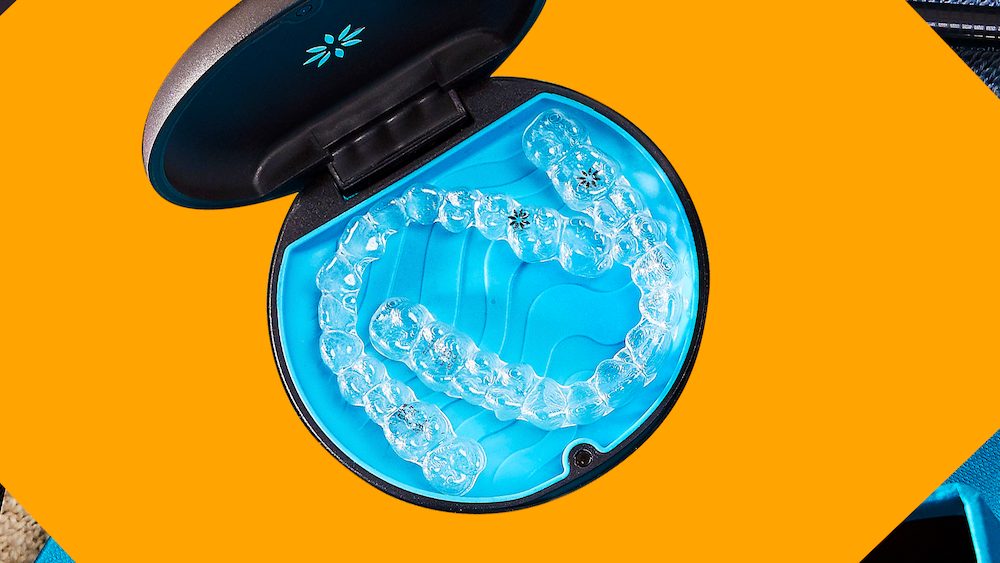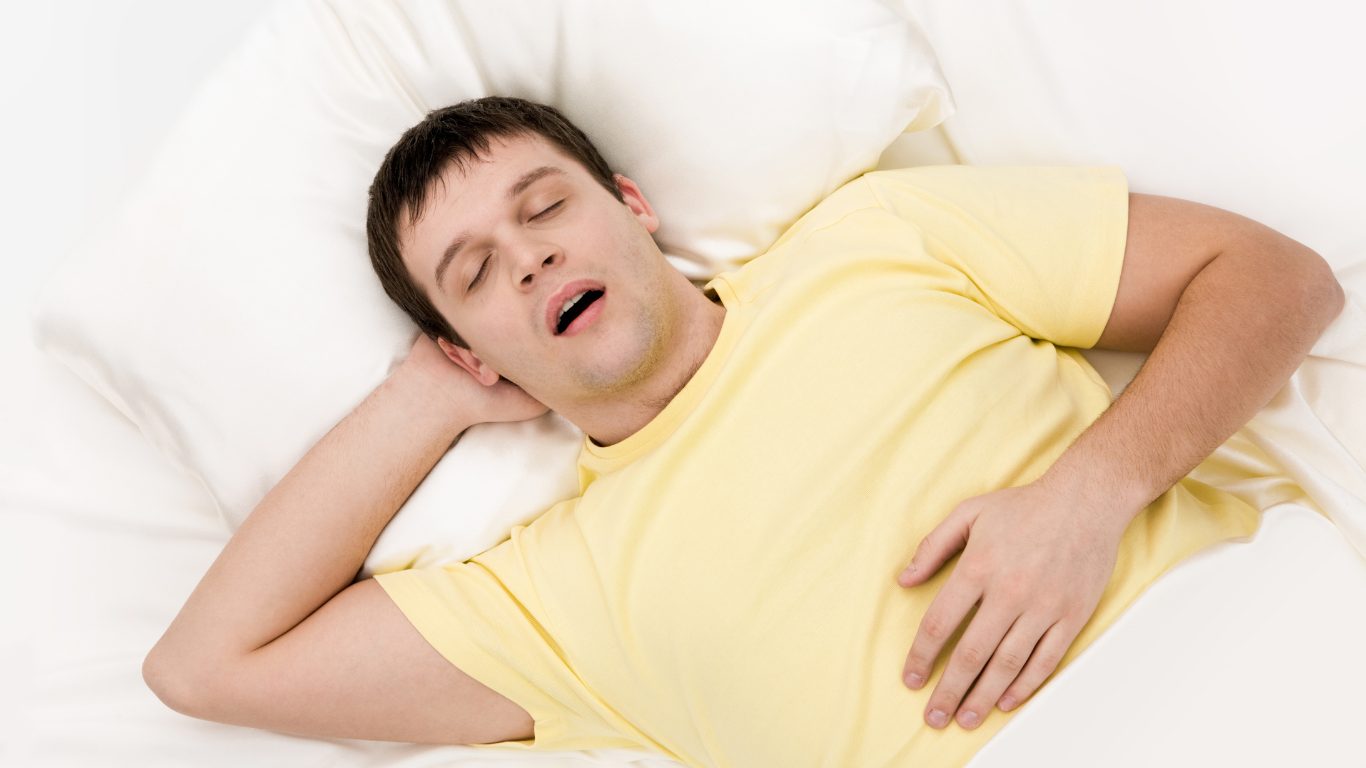
How Long Do You Have to Wear Invisalign?
August 12, 2021
Can Invisalign Fix Gaps in Your Teeth?
September 2, 2021Mouth breathing during sleep is a common oral health concern for both adults and growing children. Sometimes it is a minor issue and other times serious enough that a dentist or physician may recommend mouth taping at night.
If you recently Googled “taping mouth at night” or “lip taping mouth breathing,” you have come to the right place. We hope this article answers some of your questions about lip taping mouth breathing and helps you make informed decisions for yourself and your family.
Since mouth breathing has so many causes, each patient requires individual care. Please talk with your physician and dentist if you or one of your dependents frequently breathes through the mouth at night. This article is not a substitute for professional medical advice.
The Problem With Mouth Breathing
Sometimes breathing through the mouth is healthy and ideal. For example, while running or during a vigorous workout, you simply can’t take in enough oxygen by breathing through the nose. Mouth breathing is very healthy in this situation.
Also, if your nose is stuffed up due to a cold, flu, or allergies, you may temporarily need to breathe through the mouth to get enough air. Beyond that, your body benefits most from nose breathing. Your nose acts as a filter keeping particles of dust and tiny debris out of your lungs.
Breathing through your nose also helps your body produce nitric oxide. This helps widen your blood vessels and helps oxygen efficiently circulate throughout your body.
On the other hand, habitually breathing through your mouth doesn’t provide these same benefits. In fact, it may be a sign of obstructive sleep apnea and puts your heart at risk. Children who are mouth breathers also may suffer from misalignments in their teeth, improper facial bone development, trouble speaking, and other developmental issues.
Mouth breathing may also negatively impact oral health by contributing to dry mouth, teeth shifting, and tooth decay. It is also a sign of breathing issues that can negatively affect children and adults of any age.
Why Try Lip Taping
Taping the lips closed while sleeping trains you to breathe through your nose while you sleep. It helps break the habit of mouth breathing, especially when combined with other therapies to address the causes of the individual’s mouth breathing.
Sometimes a patient needs to see a Myofunctional therapist for treatment to stop mouth breathing. This treatment might involve various techniques, including breathing exercises, lip taping at night, and addressing any underlying conditions that contribute to mouth breathing.
Sometimes people who are not familiar with therapeutic lip taping have concerns that it may be painful or uncomfortable. We assure you that when done correctly, it is not. Some people even credit the treatment as life-changing since people who breathe through their mouths at night usually are not getting enough high-quality and restful sleep.
We hope the following description of at-home lip taping will reassure you and ease some of your concerns. The process is simple to perform and gentle as long as you follow your dentist’s instructions.
How to Perform Lip Taping
Always talk with your dentist, health care provider, or a Myofunctional therapist about whether lip taping is appropriate. Your care provider or a specialized therapist should teach you the correct technique. Here is a basic overview so that you get an idea of what it is like to tape your lips during sleep:
- First, make sure you are about to breathe through your nose easily for 30 min. A great way to test this is to hold water in your mouth for as long as you can or to tape your lips while working or playing.
- Using the right kind of tape is important. The tape should be gentle enough to avoid irritating the sensitive skin on and around your lips. Sleep tape or surgical tape is ideal since they are designed to gently tape skin. We recommend Myotape or 3M porous tape.
- Lightly moisturize your lips and the skin around your mouth before applying the tape. This also makes it easier to remove the tape in the morning without tearing the skin. If you don’t use a moisturizer, you may also have annoying sticky residue around your mouth and on your lips in the morning.
- Take a piece of tape and place it horizontally over your lips. If you are not yet comfortable, you may place the tape vertically to allow your mouth to open slightly if necessary.
- Try this during the day or early evening to get used to it before taping your lips overnight.
- Gently remove the tape in the morning.
As you may now understand, you should not use duct tape or any other kind of tape that isn’t designed for taping sensitive skin. Learning this often reassures people who are initially resistant to taping their own or their child’s lips during sleep. Taping your mouth shouldn’t be painful.
Taping is a useful training tool. Many patients find they wake up feeling well-rested for the first time in years after they get used to lip taping. Some are quick to dismiss lip taping as another wellness fad without recognizing the real damage that mouth breathing can do to a person’s oral health and overall health.
The health benefits include improved sleep, allowing the PH balance in your mouth to normalize, and more efficient oxygen circulation in the body.
Next Steps: See Your Dentist or Healthcare Provider
Talk with your dentist if you believe that you or your child breathes through the mouth while sleeping. As mentioned, mouth breathing contributes to dry mouth and a range of other oral health concerns. Dentists regularly help patients overcome mouth breathing.
If you live in the Charlotte area and need to talk with a dental professional about mouth breathing, contact us at Southview Dentistry. Dr. Kelly Wilson is a trained myofunctional therapist and can help get you breathing properly through your nose. We love helping our patients live healthy lives. This is why we keep up with evidence-based treatment options and best practices in dentistry.
We also treat each patient as an individual. Call us today to schedule an examination or appointment.




